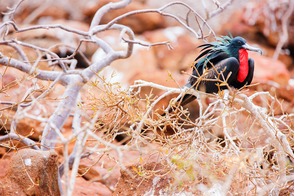
Duration
7 Nights
Journey Type
Sailing from Ecuador
Ports
15 Ports
18 January
Setting sail from San Cristóbal Island
San Cristóbal is the most easterly of the Galapagos islands, home to the provincial capital and second largest human settlement in the archipelago, Puerto Baquerizo Moreno. The fantastic wildlife includes fur seals, boobies and the endangered Chatham frigatebird.


Our tip
Take an underwater camera - the marine life in the Galapagos is spectacular, with sea turtles, penguins, manta rays and more lurking beneath the surface.
18 January
Ecuador: Roca León Dormido

The iconic twin lava towers of Kicker Rock sit just off the coast of San Cristóbal, and if you’re lucky with the weather you’ll be treated to a spectacular sunset here. The island is known as Roca León Dormido in Spanish, as the rocks resemble a sleeping lion when viewed from the south.
19 January
Ecuador: El Barranco (Genovesa Island)

At El Barranco, also known as Prince Philip’s Steps after the Duke’s visit in 1964, you’ll ascend the lava rock cliffs to a plateau where Genovesa’s amazing birdlife comes to the fore. Look out for species including storm petrels, Nazca and red-footed boobies, magnificent frigatebirds and short-eared owls.
19 January
Ecuador: Bahia Darwin (Genovesa)

The horseshoe-shaped island of Genovesa, located in the northeast of the Galapagos archipelago, is best known for its abundant bird life. Red-footed boobies can be found in significant numbers here, along with storm petrels, frigatebirds, mockingbirds and short-eared owls.
20 January
Ecuador: North Seymour

North Seymour island, named after the English nobleman Lord Hugh Seymour, is home to some of the biggest sea bird breeding colonies in the Galapagos. This is one of the best places to see the magnificent frigatebirds, along with blue-footed boobies and land iguanas.
20 January
Ecuador: Sullivan Bay (Santiago Island)

The otherworldly lava fields of Sullivan Bay are formed from rope-like lava known as pahoehoe, and date back to an eruption in 1897. Vivid red Sally Lightfoot crabs are a common sight scuttling across the black rocks, and the bay is home to a very small colony of Galapagos penguins.
21 January
Ecuador: Mangle Point (Fernandina Island), Punta Moreno (Isabella Island)
22 January
Ecuador: Los Gemelos

Los Gemelos, the ‘twins’, are two huge sinkholes up in the lush highlands of Santa Cruz island. Birds including Darwin finches and mockingbirds can be spotted amongst the foliage, and the nearby Rancho El Manzanillo is the best place on the island to see giant tortoises in the wild.
22 January
Ecuador: Puerto Ayora

Puerto Ayora is the largest town in the Galapagos, on the south coast of Santa Cruz island. From here you can visit the lush highlands where giant tortoises roam free, and you can learn more about tortoise conservation at the Charles Darwin Research Station.
23 January
Ecuador: Gardner Bay (Española)

The beautiful white sand beach of Gardner Bay is situated on the north coast of Española, one of the oldest islands in the Galapagos archipelago. Just offshore is Gardner Islet, a great snorkelling spot where you can see sea lions, green turtles and (if you're lucky) reef sharks and rays.
23 January
Ecuador: Punta Suárez (Española)

Española is the most southerly island in the Galapagos, and the remote location means it's home to several endemic species, including the Española lava lizard and the Española mockingbird. The island is also famous as the breeding ground for waved albatrosses, but the birds are absent between January and March.
24 January
Ecuador: San Cristóbal Island

San Cristóbal is the most easterly of the Galapagos islands, home to the provincial capital and second largest human settlement in the archipelago, Puerto Baquerizo Moreno. The fantastic wildlife includes fur seals, boobies and the endangered Chatham frigatebird.
24 January
Ecuador: Cerro Brujo (San Cristóbal Island)
25 January
Arriving in San Cristóbal Island
Your home from home



Silversea's stunning new Silver Origin is the most luxurious ship in the Galapagos, purpose-built for this unique environment.
What we love
The intimate 100-guest Silver Origin gives you a supremely comfortable home from home, as you explore the varied islands of the Galapagos by zodiac and kayak. Learn more about the archipelago's flora and fauna at the Basecamp, with its amazing interactive wall, socialise over cocktails at the Explorer Lounge, and cosy up around the outdoor firepit after dinner.
| Capacity | 100 Guests |
|---|---|
| Crew | 90 Ecuadorian Staff |
| Style |
This stylish sleek ship offers a warm Ecuadorian welcome and a stimulating programme on board. If you enjoy the finer things in life but have an adventurous spirit, you will find yourself in congenial company on board. |
| Inclusions |
|
Tailor-make your trip

Mashpi Lodge
A stay at Mashpi Lodge, in the heart of Ecuador's stunning cloud forest, is a luxurious way to extend your trip to South America.

Lake Titicaca
How about pairing your Galapagos cruise with an overland adventure through Peru to Lake Titicaca, perhaps even crossing the border into starkly beautiful Bolivia.











